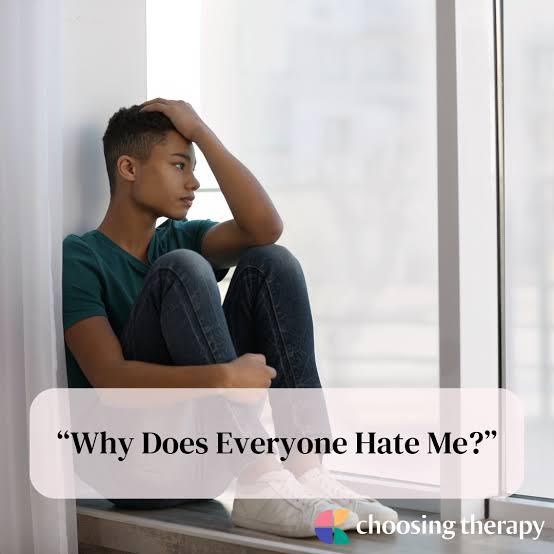
Why Do I Think Everyone Hates Me? A Step-by-Step Guide to Understanding and Overcoming This Feeling
There are times when a sudden, overwhelming feeling takes over, making you believe that everyone dislikes you. Maybe a friend didn’t reply to your message as quickly as you expected, or you see a group of people hanging out without inviting you. Your mind spirals, turning a small thought into something bigger—“Do they hate me?”
This can be linked to past experiences or even social anxiety, where your brain jumps to the worst conclusions. These thoughts often come from cognitive distortions, ways your brain tricks you into believing something untrue.
“Ever wondered, ‘Why do I think everyone hates me?’ People can start doubting themselves when they receive no response from messages or invites even though such doubts usually come from inaccurate thoughts rather than the true situation.
Moving ahead requires addressing and dismantling your worries through their systematic evaluation. Ask yourself: “Is there real proof that they hate me, or is my brain assuming the worst?” Try to reframe the situation from a healthier perspective—maybe your friend was busy, or the group didn’t think to invite you, not because they dislike you, but simply because plans came together last minute.
Overcoming these feelings is a step-by-step process. It takes effort, but with time, you can train your brain to recognize these patterns and replace them with more balanced thoughts.
Step 1: Understanding Why You Feel This Way
“The Pain of Feeling Unwanted: Why Do I Think Everyone Hates Me?”
That feeling of being disliked doesn’t always come from reality—it often comes from the way our mind is wired. Your brain can develop negative thought patterns that trick you into believing things that aren’t necessarily true. This is called cognitive distortions, and it can make you assume the worst, even when there’s no real reason. Giving hate to others effect our mental health.
Social media influence can make this worse. Some gatherings do not aim to exclude anyone while others do involve small or casual events.
Mental condition constitutes another influencing factor. Low self-esteem can make it hard to see the good in yourself, making you more likely to think others dislike you. Mental health struggles like depression, anxiety, or bipolar disorder can intensify these thoughts, leading to isolation. If this sounds familiar, remember that these feelings don’t define your worth—your thoughts aren’t always facts.
Step 2: Recognizing Cognitive Distortions
Sometimes, your brain can work against you, making you believe things that don’t match reality. These are called cognitive distortions, and they can make small situations feel much worse than they actually are. When left unchecked, they can convince you that everyone dislikes you, even when there’s no real proof. We should try not to hate anybody.
One common distortion is all-or-nothing thinking. If one person doesn’t invite you to something, you might think no one ever will. Another is catastrophizing, where one small mistake makes you think something terrible will happen—like assuming a friend didn’t respond to your message because they don’t like you. I used to think this way too, always assuming the worst instead of looking at the bigger picture.
“Overcoming the Fear of Rejection: Why You Think Everyone Hates You”
Personalization is another trap. If a friend seems quiet, you might think, “They must be mad at me,” even if they’re just having a bad day. Mental filtering makes things worse by focusing only on negative interactions and ignoring the positive ones. Understanding the patterns you face marks the initial milestone for ending their grip on your life.
Step 3: Reframing Negative Thoughts
The first step to changing how you feel is to recognize the negative patterns in your thinking. Your mind might keep assuming the worst without real proof. Challenging these thoughts can help break the cycle. Instead of jumping to conclusions, ask yourself: “Is there actual evidence that supports this thought, or is it just my fear taking over?” Do not hate anybody without any reason.
For example, if a friend doesn’t text back right away, your brain might tell you they’re ignoring you. But what if there’s another explanation? Maybe they’re busy, stressed, or simply forgot to reply. If you look closely, you might find evidence that contradicts your fears—like times they did reach out and show they care. Hate someone reframing negative thoughs.
It’s important to consider different perspectives before letting your thoughts spiral. Developing the ability to question assumptions helps people view their situations with better perspective.
Step 4: Shifting Your Perspective
One big mistake we make is trying to stop mind-reading—acting like a psychic who somehow knows what others are thinking. But the truth is, unless someone directly tells you, you can’t be sure of their thoughts. I used to believe people were upset with me, only to later find out they were just dealing with their own struggles that had nothing to do with me. I shot myself. Hate spread negavtive thoughts so w should avaod this perception.
A great way to change your thinking is to put yourself in their shoes. When your friend appears less social perhaps they need rest after a busy schedule. Instead of jumping to negative conclusions, try to give people the benefit of the doubt.
All short replies and missed phone calls do not necessarily indicate dislike. The way you look at situations from a fair perspective releases you from pointless worrying so that you can maintain peace in your relationships.
Step 5: Healthy Coping Strategies
One of the best ways to stop assuming the worst is to communicate openly. A simple message like, “Hey, I’ve been feeling off. Just reaching out to see if everything is okay,” can clear up misunderstandings and give you peace of mind. Ask yourself, “Do I have real proof that someone dislikes me, or is this just my mind playing tricks?” A balanced perspective prevents you from fearing things that do not exist. Hate effect our healthy life.
It’s also important to practice self-compassion. Speak to yourself the way you would to a friend—with kindness, not criticism. Creating positive behaviors will additionally benefit you. Engage in activities that make you feel good, like exercise, hobbies, or spending time in nature.
Step 6: Knowing When to Seek Help
Sometimes, negative thoughts become too overwhelming and don’t go away. If these feelings are persistent, it might be time to consider therapy. Talking to a mental health professional can be a good option when self-help strategies aren’t enough.
A therapist can help challenge the deep-rooted beliefs that make you feel disliked. Often, these thoughts come from past experiences, and breaking free from them takes time. With the right support, you can develop strategies to manage feelings effectively and see things from a healthier perspective.
Seeking help doesn’t mean something is wrong with you—it means you are strong enough to take control of your thoughts. You should contact somebody if self-doubt disrupts your everyday routine. Your worth deserves to reach harmony and recognition.
“When Your Mind Lies to You: Why You Feel Everyone Hates You”

Final Thoughts
It’s important to remind yourself that just because you feel like everyone dislikes you, it doesn’t mean it’s true. Your worthiness for connection and love remains intact despite any doubts about it.
Building self-awareness is key to breaking free from these negative thoughts. Small mindset shifts can help you start seeing your relationships in a more balanced way. Instead of assuming the worst, try to be willing to challenge those thoughts and look at situations from a different perspective.
These changes take time, but each step you take helps you break free from unhealthy thinking patterns. With patience and self-compassion, you can learn to trust yourself and build healthier connections with the people around you.
https://psychcentral.com/health/everyone-hates-me
https://www.verywellmind.com/what-to-do-when-you-feel-like-everyone-hates-you-5194496a
https://www.vice.com/en/article/everyone-hates-me-anxiety-psychology-mental-health/a
https://www.medicalnewstoday.com/articles/325705
https://depthofthoughts.site/wp-admin/post.php?post=2516&action=editf

One thought on “WHY DO I THINK EVERYONE HATES ME”